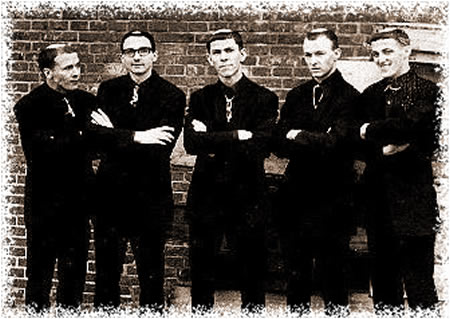
Tracks like Lyrically the band truly shines. As they are all vocalists, each one takes part in the chanting frustration, love sickness, or eccentricity of the lyrics. Casting baroque ideas aside, The Monks use force, not beauty to convey the messages. Some mask the rhythmic nature they employ like in the song Cuckoo:
Cuckoo, cuckoo,Even reading it, one stresses and unstressed in a 4/4 pattern. But its not only in this they can excel, check out the invocation on opener Monk Time, quickly followed by an up-front barrelling into a message:
Who's got the cuckoo?
Now someone stole my cuckoo,
And I wanna know who who
Alright, my name's Gary.The love-sour call and response of I Hate You combines their staunch, harmonizing shouts with their blatant messages.
Let's go, it's beat time, it's hop time, it's monk time now!
You know we don't like the army.
What army?
Who cares what army?
Why do you kill all those kids over there in Vietnam?
Mad Viet Cong.
My brother died in Vietnam!
Hey, well, I hate you with a passion baby, yeah I do!Despite their out-their sound, these 12 tracks, and even the bonus ones, are very accessible. Its a pop album. It sounds close enough to the vein of 60s British invasion while being original. In a sense they were as important as the Velvet Underground, having influenced a number of musicians such as The Dead Kennedys, Beastie Boys, and Henry Rollins. Although short lived, they continue to be felt throughout the music world.
(But call me!)
Well you know my hate's everlasting baby, yeah, yeah!
(But call me!)
Do you, do you, do you know why I hate you baby, do you now?
(But call me!)
Well, it's because you make me hate you baby, yeah you do now.
(But call me!)

